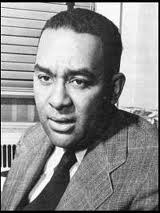
Richard Nathaniel Wright was a writer and poet. Wright was born on Sept. 4, 1908 near Natchez, Mississippi. He was the grandson of slaves and the son of a sharecropper; he went to school in Jackson, Mississippi only until the ninth grade. Wright had a story published at age 16 while working at various jobs in the South. In 1927 he went to Chicago and worked briefly in the post office and then joined the Communist Party (1932) after the Great Depression.
With two more minor works published, he found employment with the Federal Writers Project, and his Uncle Tom’s Children (1938), a collection of four stories, was highly acclaimed. In 1937 he moved to New York City, where he was an editor on the Communist newspaper, Daily Worker. But the publication of Native Son (1940) brought him overnight fame and freedom to write. A stage version (by Wright and Paul Green) followed in 1941 (and Wright himself later played the title role in a film version made in Argentina).
Black Boy, published in 1945 is a moving account of his childhood and youth in the South and depicts extreme poverty and his accounts of racial violence against blacks. The autobiography advanced Wright’s reputation, but after living mainly in Mexico (1940–6) he had become so disillusioned with both the Communists and white America that he went off to Paris, where he lived the rest of his life as an expatriate. He continued to write novels, including The Outsider (1953) and The Long Dream (1958), and non-fiction, such as Black Power (1954) and White Man, Listen! (1957), and was regarded by African American writers, such as James Baldwin, as an inspiration. His naturalistic fiction no longer has the standing it once enjoyed, but his life and works remain exemplary.
Richard Nathaniel Wright died on Nov. 28, 1960 in Paris, France.








